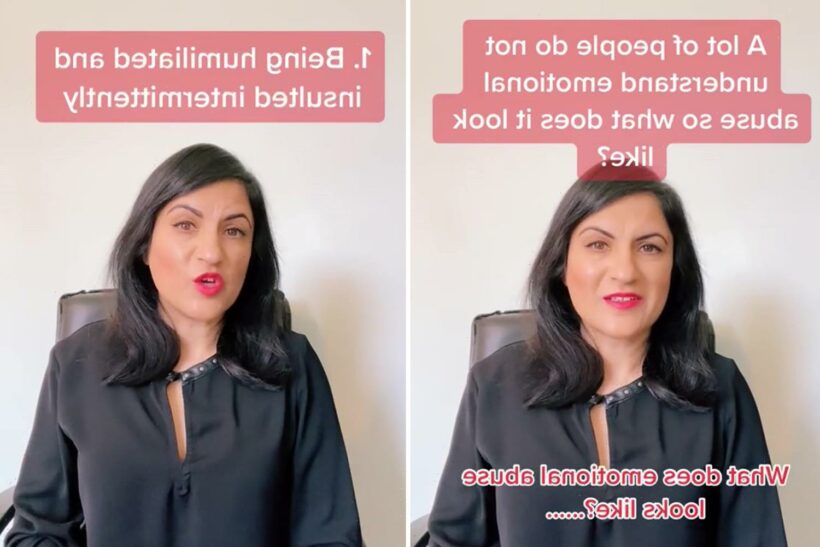THERE are highs and lows in any relationship, but have you ever felt not heard or denied from certain things with your partner?
It could be that you’re in an emotionally abusive relationship.
Manjit Ruprai, a narcissistic abuse recovery therapist, dedicates her TikTok channel to understanding the workings of a relationship.
She says that there are six signs to look out for, as many do not understand emotional abuse.
Emotional abuse is any abusive behaviour that isn't physical, which may include verbal aggression, intimidation, manipulation, and humiliation.
In one of her videos, Majit says: “A Lot of people do not understand emotional abuse, so what does it look like?
- Being humiliated and insulted intermittently
- Having no involvement in decision making
- Never having your feelings acknowledged or heard
- Meeting all of their needs and yours are denied
- Being blamed for their actions
- Accused of being crazy or sensitive
“If something feels abnormal, get yourself out quickly. Follow your gut.”
In another video she also explains the types of narcissistic groups that people in relationships need to be aware of.
She says: “Not all narcissists are the same.
“An overt narcissist is an exhibitionist, charismatic, big personality, grandiose, egotistical. Unafraid to show power and control.
“Covert narcissists are highly manipulative, play the victim, passive aggressive, you will feel sorry for them because of their victim mentality.
“Somatic narcissists are into their looks, they are very slick and polished, arrogant and have to have the latest of everything.
“Cerebral narcissists with hold sex. They are intelligent and successful. They are knowledgeable. They flaunt their success in order to entice their supply.
What are the different types of emotional abuse?
- Humiliating or constantly criticising a child
- Threatening, shouting at a child or calling them names
- Making the child the subject of jokes, or using sarcasm to hurt a child
- Blaming and scapegoating
- Making a child perform degrading acts
- Not recognising a child's own individuality or trying to control their lives
- Pushing a child too hard or not recognising their limitations
- Exposing a child to upsetting events or situations, like domestic abuse or drug taking
- Failing to promote a child's social development
- Not allowing them to have friends
- Persistently ignoring them
- Being absent
- Manipulating a child
- Never saying anything kind, expressing positive feelings or congratulating a child on successes
- Never showing any emotions in interactions with a child, also known as emotional neglect.
Source: NSPCC
“Parasitic narcissists look down on their victims, make you feel unloved. They look for strong and intelligent supply. Like a parasite they feed off their victims.
“Amorous narcissists put their victims on a pedestal. They want supply that looks good. You are not allowed to be yourself.
“Narcissists will cross over in these groups.”
You might also want to read, Doctor reveals the warning signs you’re dating a narcissist, from telling lots of stories to showing off
And take a look at this, Relationship coach reveals how an ‘imaginary person’ helps save their marriage – and others agree it works.
Also, I flew 24 hours from Australia to UK for a man – day 2 we had a huge row & I knew he wasn’t the one, it cost thousands.
Source: Read Full Article



